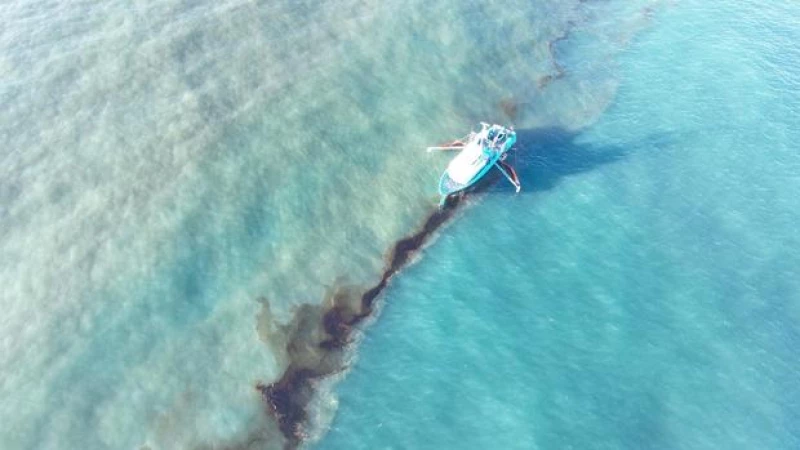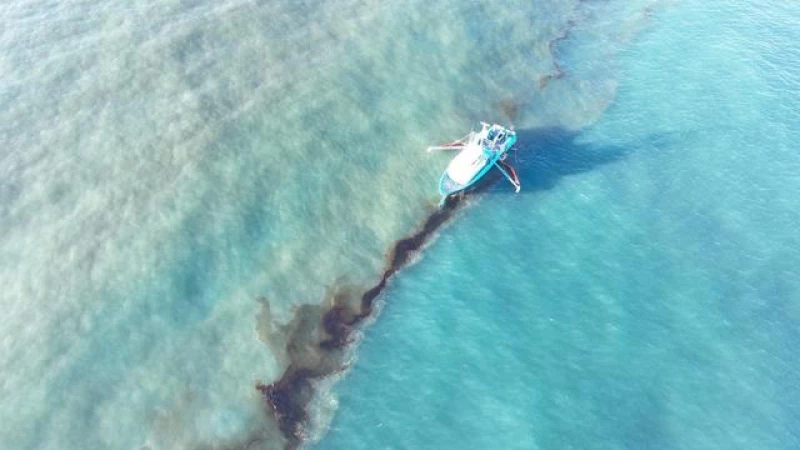U.S. Coast Guard Reports Massive Oil Spill in Gulf of Mexico
The U.S. Coast Guard announced on Monday that a significant oil spill has occurred in the Gulf of Mexico, near a pipeline off the coast of Louisiana. It is estimated that approximately 1.1 million gallons of crude oil have leaked into the ocean. This incident has raised concerns about the potential impact on endangered and threatened species in the area.
Coast Guard officials first noticed the spill on Friday when an aircrew identified the leak. The leak is located near the Main Pass Oil Gathering company's pipeline system, which stretches for 67 miles near Louisiana's Plaquemines Parish. While the exact start date of the leak is unknown, the pipeline was shut down at 6:30 a.m. on Thursday.

According to officials, the volume of discharged oil is currently unknown. However, initial engineering calculations suggest that approximately 1.1 million gallons of crude oil could have been released from the affected pipeline.
The Coast Guard conducted cleanup operations in the affected area. On Friday, oil was skimmed and sampled approximately four miles southeast of South Pass, Louisiana. During this operation, about 210 gallons of an oily-water mixture were retrieved. Additionally, more oil was recovered on Sunday, approximately 13 miles southeast of the parish.
Photos of the spill show large chunky globules and long slicks of oil floating on the Gulf's surface.
Plaquemines Parish officials wrote on Facebook over the weekend that they are "monitoring the incident," but have not posted any further updates.
So far, it remains unclear where the oil leaked from. The Coast Guard said Tuesday that remotely operated vehicles have been deployed to survey the pipeline, but that there are "no findings of a source area at this time."
Matt Rota, senior policy director for Healthy Gulf, told CBS affiliate WWL-TV that the amount of oil thought to have spilled could still increase.
"Especially when estimates come from companies...their business interest is to show that the smaller amount is coming out because they are liable for fines," Rota said.
NOAA is helping oversee the incident, and the agency's emergency operations coordinator Doug Helton told WWL that it's not necessarily the amount of oil, but its impact, that is of most concern.
Louisiana waters are home to several endangered and threatened species. The majority of the coastal area in Louisiana is made up of wetlands and marshes, which are highly sensitive to oil spills," said an expert. "Even if the oil doesn't reach the shore, we cannot ignore the impact it can have on the marine life in the Gulf."
Among the species of concern, turtles are one of the biggest. "Turtles are probably one of the biggest concerns that we might have," the expert added.
Located just north of the spill and Plaquemines Parish are the Chandeleur Islands, where the world's most endangered sea turtle species, the Kemp's Ridley, was found hatching last year for the first time in 75 years. This species is the smallest sea turtle species in the world and has been considered endangered in the U.S. since 1970. It is also critically endangered globally, meaning it is at an extremely high risk of extinction in the wild, according to the International Union for Conservation of Nature and Natural Resources.
The Gulf is also home to some of the most endangered whales in the world. Last year, NOAA revealed that Rice's whales, which can grow to be longer than a full-size school bus, are the only baleen whales known to inhabit Gulf waters. These whales are primarily found between Louisiana and Florida, and experts estimate that there are fewer than 100 individuals remaining. Scientists have warned that pipelines pose a major risk to their existence.
"The survival and recovery of whales are clearly threatened by the continued development of oil and gas in the Gulf," stated a collective of 100 scientists in a letter addressed to the Biden administration last year. The government's Natural Resource Damage Assessment on the Deepwater Horizon oil spill estimates that nearly 20% of whales in the Gulf of Mexico were killed, and additional animals experienced reproductive failure and disease."







